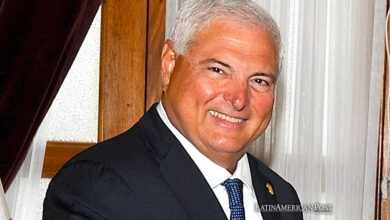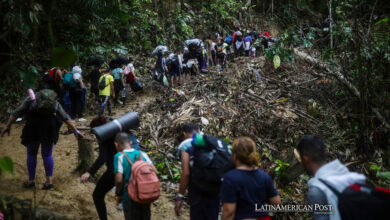Panama Imposes Indefinite Freeze on Mining Concessions Amid Protests
In a decisive move to recalibrate the nation's mineral exploitation strategy, Panama's President, Laurentino Cortizo, has enacted a sweeping moratorium on new mining concessions, halting renewals. This measure emerges amid intense debates on environmental conservation and economic pragmatism, reflecting a profound pivot in Panama's approach to natural resource management

Photo: 05/11/2023.- Demonstrators protest against a controversial contract law that renews a 20-year renewable concession to Minera Panama, a subsidiary of Canada’s First Quantum Minerals. EFE/ Gerardo Pesantez
The Latin American Post Staff
Escucha este artículo
Leer en español: Panamá impone congelamiento indefinido de concesiones mineras en medio de protestas
President Cortizo's Environmental Initiative
In a historic step signaling Panama's heightened environmental consciousness, President Laurentino Cortizo has affixed his signature to a groundbreaking law. This statute establishes an indefinite moratorium on issuing new mining concessions while simultaneously prohibiting the renewal of existing ones. This pivotal legislation was ratified just one day following its endorsement by Panama's National Assembly, reflecting the government's urgent response to escalating tensions over environmental concerns and the rights of indigenous populations.
Amid the law's enactment, an essential provision that proposed revoking a contentious mining contract was excised, which has somewhat dampened the enthusiasm of nationwide protests. The agreement with Minera Panama—a subsidiary of the Canadian giant First Quantum—will persist, permitting the continued operation of a large open-pit copper mine in Colon state. This concession, which has a lifespan of 20 years with the option for a 20-year renewal, stands in stark contrast to the otherwise stringent stance of the new law.
Concerns Over Ecological Impact
This mine, already a behemoth in the landscape, looms over the verdant jungles of Panama, with environmental advocates sounding the alarm on the potential for catastrophic ecological damage. The risk to the surrounding jungle and the local water sources is a flashpoint in the ongoing discourse as conservationists and indigenous communities decry the project's environmental footprint.
Legal circles have shown a mixture of responses to the president's decision. While some lawyers have heralded the move, emphasizing the potential for crippling legal liabilities should the controversial contract be rescinded, others have pointed out that these could be circumvented if Panama's Supreme Court rules the contract unconstitutional. This outcome remains possible as many legal challenges against the contract continue to wend their way through the judiciary.
Legislative Landscape
Simultaneously, the legislative landscape in Panama remains dynamic, with another bill poised for debate that would subject the mining contract to a national referendum. This would offer a direct voice to the Panamanian populace, whose opinions have already been vigorously expressed through ongoing protests and demonstrations. These public outcries have united diverse sectors of society, including indigenous groups, educational workers, and professionals from the construction and healthcare industries, highlighting the widespread concern over mining operations.
President Cortizo's final endorsement of the contested contract on October 20 did little to quell the disquiet, which has continued to manifest in nationwide demonstrations. The protestors' resolve underscores a collective unease with the broader implications of mining activities on the environment and public health, particularly the safeguarding of water resources.
Panama's Global Perspective
Panama's legislative shift mirrors a global trend of increased scrutiny on mining operations, where environmental and social governance is becoming paramount. Notably, in 2017, El Salvador became a pioneer, enacting a total prohibition on the mining of metals, a bold stance taken to preserve the nation's water supply. Panama's law, while less expansive, signals a similar inclination to prioritize environmental stewardship over unfettered resource extraction.
Also read: Panama's Uprising Against Mining Leads to Legislative Action
Panama's Environmental Ethos
The Panamanian moratorium on new mining concessions represents a delicate balance between the imperative to protect natural resources and the pragmatic acknowledgment of existing contractual obligations. The government's decision to allow Minera Panama's operations to continue reflects a nuanced approach, aiming to safeguard the country's environmental interests without precipitating a legal maelstrom that could entangle the nation in multimillion-dollar liabilities.
In conclusion, Panama's indefinite moratorium on new mining concessions is more than a legislative action; it manifests an emerging environmental ethos, a dialogue between progress and preservation. The world watches as Panama navigates this complex terrain, balancing ecological imperatives with economic and legal considerations. The outcomes of this path will undoubtedly serve as a barometer for other nations wrestling with the intricate interplay of environmental sustainability and developmental aspirations.




